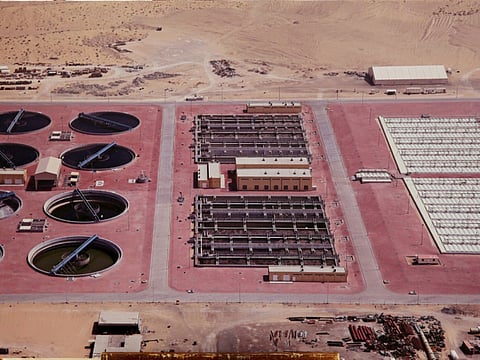Sewage plant upgrade to serve 1.3m people
Treated grey water and sludge at the plant will benefit the environment and agriculture

Dubai: A Dh2.8 billion sewage treatment upgrade in Jebel Ali is going to help Dubai cope with major expansions in the next decade, a Dubai Municipality official said.
Dubai Municipality on Sunday inked a new contract to double the sewage treatment capacity in Jebel Ali from 300,000 cubic metres per day to 675,000 cubic metres. This will be the third sewage treatment project after the Al Warsan plant and the current one in Jebel Ali area, which will now be expanded to help serve 1.3 million people without any additional enhancements until 2025.
Hussain Nasser Lootah, director-general of Dubai Municipality, said the expansion of the Jebel Ali plant is a three-pronged plan to prepare Dubai for future growth. He also said that the Jebel Ali area is capable of accommodating seven plants in total up to 2035 if any further expansions are needed.
“The new system, to be completed in three years, will help absorb the excess flow to be caused by the planned EXPO zones, cope with the future expansion projects and direct part of the load borne by the Al Warsan plant, which exceeds its design load by 27 per cent to Jebel Ali.”
The environmental-friendly plant on Jebel Ali-Lahbab Road, according to the civic body, will be equipped with the latest and most advanced sewage treatment processes, facilities and modern technologies, including a fertiliser production technology to prevent polluting emissions.
Treated grey water and sludge — by-products from the process — will benefit the environment and agriculture, said Lootah.
“Sludge will be treated thermally to produce high-quality fertiliser that can be used to enrich agricultural lands and treated wastewater will help reduce pressure on water resources, as desalination and deep wells will be used for planting in major public, residential and neighbourhood gardens, parks, natural areas, leisure and recreation spots and for greening the city in general.”
Lootah said the plants are very important for the city and are helping towards achieving the strategic plan of Dubai to increase the green areas in Dubai by eight per cent.
“Treated wastewater will be used to step up biodiversity efforts. Various trees, flowers and birds will be nurtured by providing for their basic systems through the planting of different flora,” he said.
Efforts to preserve natural reserves will also be supported by maintaining a population of small insects, worms, spiders and reptiles in the water for feeding, he added. “The water has to be treated at specific concentrations suitable for such tiny creatures.”
Demand for treated water is expected to increase in the future, Lootah pointed out, as fertilisers continue to be produced from solid wastewater generated by the municipality’s treatment plants.
The total amount of fertilisers produced last year was at 6.8 million tonnes, of which nearly 5.6 million tonnes were sold. Private farms also benefited from them.
“Fertilisers are used in animal feed production. They are used to cultivate grass mats, used afterwards as green carpets for gardens, playgrounds, streets and other applications. Around 18,000 sq m of these mats are cultivated annually. Around 1,321 tonnes of fertilisers were produced for plantation purposes last year.”
Belhasa Six Construct, the contracting company, said they have mobilised the teams to start efficiently and quickly on the project to deliver it to the city in the right quality and right time frame.
Three stages for the treatment plant
Initial mechanical stage – (Currently)
Second biological stage
Sterilisation phase (To use UV rays to kill bacteria and prevent growth of microbes)



